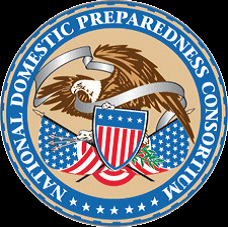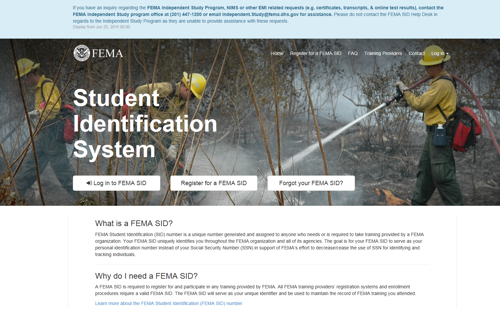Training + Events Overview

The State’s Training Program – administered and coordinated by GOHSEP– is responsible for assisting emergency managers, first responders and other emergency management stakeholders to receive homeland security and emergency management training. GOHSEP training opportunities enhance the safety of Louisiana communities and the State so that Louisiana’s leaders, first responders and citizens are better prepared for any emergency or disaster.
The GOHSEP Training Program coordinates numerous training opportunities for first responders and other emergency management professionals and stakeholders that address the five (5) mission areas: Prepare. Prevent. Respond. Recover. Mitigate.
GOHSEP coordinates training courses developed and funded by the U.S. Department of Homeland Security (DHS). Courses are offered tuition free through Federal training partners for first responder disciplines and elected and appointed officials from all levels of government.
Agencies and responders may verify eligibility, any associated costs, request resident or mobile training by contacting the GOHSEP Training staff. Training partners and programs include:
Homeland Security Training
Homeland Security Training is coordinated through GOHSEP and provided by national partners.
 National Domestic Preparedness Consortium (NDPC)
National Domestic Preparedness Consortium (NDPC)
The NDPC is a partnership of several nationally recognized organizations whose membership is based on the urgent need to address the counter-terrorism preparedness needs of the nation’s emergency first responders within the context of all hazards including chemical, biological, radiological, and explosive Weapons of Mass Destruction (WMD) hazards. Click on each NDPC partner listed below for more information:
 Counter Terrorism Operations Support, (CTOS), Nevada Test Site (NTS)
Counter Terrorism Operations Support, (CTOS), Nevada Test Site (NTS)
 Energetic Materials Research + Testing Center (EMRTC)
Energetic Materials Research + Testing Center (EMRTC)
 National Center for Biomedical Research + Tracking (NCBRT at Louisiana State University (LSU)
National Center for Biomedical Research + Tracking (NCBRT at Louisiana State University (LSU)
 National Disaster Preparedness Training Consortium (NDPTC)
National Disaster Preparedness Training Consortium (NDPTC)
 National Emergency Response + Rescue Training Center (NERRTC) at Texas A & M University
National Emergency Response + Rescue Training Center (NERRTC) at Texas A & M University
 U.S. Department of Homeland Security (DHS) Center for Domestic Preparedness (CDP)
U.S. Department of Homeland Security (DHS) Center for Domestic Preparedness (CDP)
 Rural Domestic Preparedness Consortium (RDPC)
Rural Domestic Preparedness Consortium (RDPC)
The Rural Domestic Preparedness Consortium (RDPC) provides training and resources for emergency first responders, with an emphasis on rural areas. The RDPC has developed its courses to address situations where resources typical of a larger department may not be available.
 National Training + Education Division (NTED)
National Training + Education Division (NTED)
National Training and Education Division (NTEDI) serves the Nation’s first responder community, offering more than 150 courses to help build critical skills that responders need to function effectively in mass consequence events. NTED primarily serves local, State and Tribal entities in ten (10) professional disciplines. It has expanded to serve the private sector and citizens in recognition of their significant role in domestic preparedness.
Emergency Management Training
Emergency Management Training is provided through the Emergency Management Institute (EMI) – the emergency management community’s flagship training institution. EMI offers resident, Independent Study and State-sponsored courses for all-hazards and emergency management professionals.
From introductory courses such as Foundations of Emergency Management, Science of Disasters, Planning and Exercise Design to more advanced course like Homeland Security Exercise and Evaluation Program (HSEEP) Training, National Incident Management System (NIMS) and mission support, EMI offers important emergency management training across mission areas – Prepare. Prevent. Respond. Recover. Mitigate.
For a complete listing of courses visit Training at FEMA or EMI Courses + Schedules.
Through its Independent Study program, EMI also offers self-paced courses designed for people who have emergency management responsibilities and the general public.
All are offered FREE-of-charge to those who qualify for enrollment. To access a complete list of courses, visit the Independent Study website.
National Incident Management System (NIMS)
NIMS is a systemic and proactive incident management approach that guides local, State, Tribal, Territorial and Federal authorities; nongovernmental organization (NGOs); and the private sector in working together – seamlessly – to prevent where possible, protect against, respond to, recover from and mitigate against the effects of emergencies or disaster events.
All EMI courses require applicants to obtain a Student Identification (SID) number. Steps to obtain a FEMA SID are:

- Step 1: To register, go to https://cdp.dhs.gov/femasid FEMA STUDENT ID WEBSITE
- Step 2: Click on the “Register for a FEMA SID” box.
- Step 3: Follow the instructions and provide the necessary information to create your account.
- Step 4: You will receive an email with your SID number. Save this number in a secure location.
The Application form must be signed by the Applicant and Applicants supervisor or person with approving authority for the sponsoring organization.
Complete a FEMA 119-25-1 form and submit with supporting documentation to GOHSEP Training or 225-358-5384.
Once an EMI application is received and approved, it is sent to EMI admissions.
Applying students receive notice of their applications no later than 60 days after the end of the application period for the course.
Build your transcript
GOHSEP has adopted an online database management tool – STEMS – to help create a profile that collates and tracks training completion information. Training participants can view and update individual STEMS profile information.
Stakeholder Education + Outreach Events

Many of the programs GOHSEP administers and manages and our sub-recipients (Applicants) and stakeholders participate in are complex, having requirements for meeting regulatory rules.
To help address those complexities and regulatory compliance, GOHSEP hosts stakeholder education and outreach events in the form of seminars, workshops and other types of meetings. These events provide program-specific implementation guidance, other valuable information and job aids to help grant Subrecipients and program participants better understand the programs in which they are involved, the roles and responsibilities they and others have, and the regulatory requirements they must meet. Education and outreach events are targeted to grant Subrecipients; program participants; emergency management professionals; local, State and Tribal executive leadership; and community and other stakeholders.
How to register?
When a training course, workshop, or seminar is planned, GOHSEP sends an eBlast to the emergency management community and other stakeholders with event and registration information.
Check the Getting it Right! Training + Events for all course listings.















